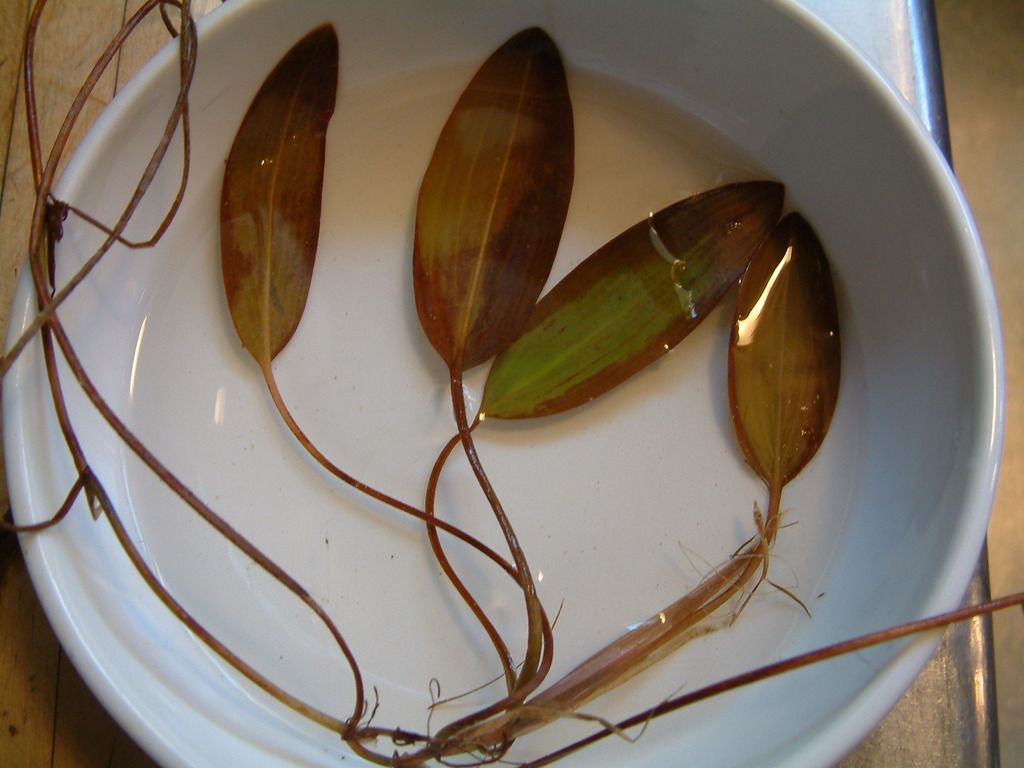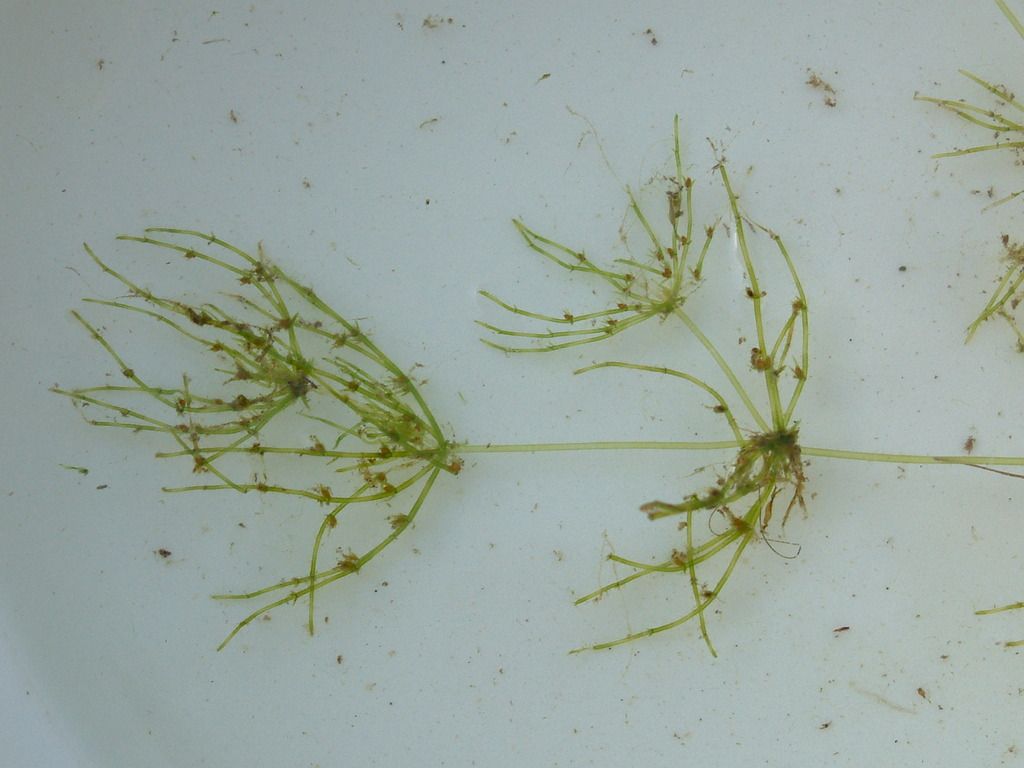|
Forums36
Topics41,038
Posts558,772
Members18,552
| |
Most Online3,612
Jan 10th, 2023
|
|
|
|
Joined: Sep 2011
Posts: 2,315
|
OP

Joined: Sep 2011
Posts: 2,315 |
Need help making sure that I have the ID right, and control if needed. The first looks like American pondweed. The second I'm not so sure about, but guessing coontail???    Control methods: Pondweed by Amur? Coontail is only by chemical?
|
|
|
|
|
Joined: Jan 2008
Posts: 8,800 Likes: 69
Chairman, Pond Boss Legacy award; Moderator; field correspondent Lunker
|

Chairman, Pond Boss Legacy award; Moderator; field correspondent Lunker
Joined: Jan 2008
Posts: 8,800 Likes: 69 |
Top could be AMPW or Illinois Pondweed - I'm not totally sure, but it's a beneficial plant in my pond and doesn't serve as a management issue - the GC and crayfish keep it under control - and it's easily fished through. Manual removal is easy enough, and GC do prefer it.
I don't know about the second one, but the leaves look too loose to be coontail - mine was much more compact and leaves were bunched like, well, a coon's tail!
I think GC will hit the Coontail eventually, if that's what it truly is, but I found Aquathol super k an immediate and thorough chemical to treat it. If that is coontail, I'd focus management strategy on it immediately over the pondweed...coontail can become a major issue in a hurry.
Hopefully Kelly will be along soon to identify.
Many men go fishing all of their lives without knowing that it is not fish they are after. ~ Henry David Thoreau ![[Linked Image from i1261.photobucket.com]](http://i1261.photobucket.com/albums/ii582/teehjaeh57/I_subscribe_zps69249d43.gif)
|
|
|
|
|
Joined: Jun 2008
Posts: 6,980 Likes: 15
Ambassador Lunker
|

Ambassador Lunker
Joined: Jun 2008
Posts: 6,980 Likes: 15 |
Any chance of that second photo being Chara? Did you crush and sniff?
"Forget pounds and ounces, I'm figuring displacement!"
If we accept that: MBG(+)FGSF(=)HBG(F1)
And we surmise that: BG(>)HBG(F1) while GSF(<)HBG(F1)
Would it hold true that: HBG(F1)(+)AM500(x)q.d.(=)1.5lbGRWT?
PB answer: It depends.
|
|
|
|
|
Joined: Apr 2002
Posts: 15,166 Likes: 496
Moderator
Ambassador
Field Correspondent Lunker
|

Moderator
Ambassador
Field Correspondent Lunker
Joined: Apr 2002
Posts: 15,166 Likes: 496 |
Second plant is Chara technically an alga as indicated by Sprkplug. Aquathol will not kill Chara since it is an alga. First picture is of one of the floating leaf Potomogeton species. The leaves appear a little too wide (or oval) for the standard American pondweed. It could be Floating pondweed or Oakes' pondweed. Big leaf pondweed (aka cabbage) has a large wide floating leaf like that but I see no large wide leaves on the stem characteristic of big leaf pondweed.
Last edited by Bill Cody; 06/22/15 09:26 PM.
aka Pond Doctor & Dr. Perca Read Pond Boss Magazine -
America's Journal of Pond Management
|
|
|
|
|
Joined: Jan 2008
Posts: 8,800 Likes: 69
Chairman, Pond Boss Legacy award; Moderator; field correspondent Lunker
|

Chairman, Pond Boss Legacy award; Moderator; field correspondent Lunker
Joined: Jan 2008
Posts: 8,800 Likes: 69 |
My Illinois pondweed suggestion was way off, I got a little confused. I looked up Bill's suggestions, and it sure resembles the Oakes Pondweed he suggested IMO.
I have chara in a couple of my ponds - 2 GC controlled it in a .2 acre pond, and my crayfish will control it in a predator free environment in a .35 acre pond. I have raked Chara easily, but it's a temporary solution only as I believe it propagates through fragments. I have read that all chemical treatments designed for algae control are effective on chara [since it's also an algae] including copper sulfate. I don't mind the chara present in my ponds as they are controlled organically by GC or crays and provide great cover for invertebrates. I have seen it take over ponds, however, and grow very densely and almost to the surface - so it can sure become a management issue if conditions are right.
Many men go fishing all of their lives without knowing that it is not fish they are after. ~ Henry David Thoreau ![[Linked Image from i1261.photobucket.com]](http://i1261.photobucket.com/albums/ii582/teehjaeh57/I_subscribe_zps69249d43.gif)
|
|
|
|
|
Joined: Apr 2002
Posts: 1,488 Likes: 2
Lunker
|

Lunker
Joined: Apr 2002
Posts: 1,488 Likes: 2 |
The critical element that's missing, particularly in the top photo, is an object for scale. The photographer knows the size of the leaves; but the casual viewer - myself included - probably perceives those leaves as larger than their actual size. That's why it's always beneficial to place a coin next to the plant for photo-ID purposes; for scale. That said, my initial guess is Potamogeton diversifolius; aka water-thread, aka variable-leaf pondweed. The last common-name is derived from the plant's "variable" leaf-structures. Look over the below images and let me know if they look like your plant. I could very well be wrong....! PS: Note how the first two photos pose an object (a hand) adjacent to the plant for scale-reference, whereas a scale-reference is missing in the bottom photo.   
|
|
|
|
|
Joined: Sep 2011
Posts: 2,315
|
OP

Joined: Sep 2011
Posts: 2,315 |
The size of the leaves in the top photo are pretty big. Widths are .75"-1.25" and lengths are 2.5" -2.75". For the most part, it covers your thumb. I will need to look up that Oakes Pondweed, never heard of that one.
By the way everyone is saying Chara on that second plant, I'll lean towards that one. However, when I crushed the piece I had no noticeable smell. Perhaps it was to old by the time I crushed it. Next time I am at the pond I will try it there.
Do Tilapia eat Chara since it's an algae form. Don't "look" like it would be their food type. I thought I noticed this plant last year, but then it went away. I did stock tilapia so I am thinking they ate it as the fish got older.
Thank you for all thr responses.
|
|
|
|
|
Joined: Apr 2002
Posts: 15,166 Likes: 496
Moderator
Ambassador
Field Correspondent Lunker
|

Moderator
Ambassador
Field Correspondent Lunker
Joined: Apr 2002
Posts: 15,166 Likes: 496 |
Tilapia do eat Chara and eat significant amounts of it depending on amount of Chara and number of tilapia stocked. Tilapia may eat the FA first then work at consuming Chara. Tilapia cleaned Chara out of a neighbor's pond. Chara in lesser amounts did return to the pond this spring.
I think the second set of pictures is of Chara due to what appears as tiny joints on the stems. These are called branchlets that arise from short cells of nodes with varying degrees of development of primary, secondary and tertieary cell rows with the primary row showing tiny spine cells which in the picture appears as "joints" or 'buds' on the leaves. Note Chara since it is an alga it does not have true leaves but branches and secondary branches (branchlets). From the picture the cell rows of the branchlets also may have tiny egg bearing case called an oogonium.
Last edited by Bill Cody; 06/23/15 09:18 AM.
aka Pond Doctor & Dr. Perca Read Pond Boss Magazine -
America's Journal of Pond Management
|
|
|
|
|
Joined: Sep 2011
Posts: 2,315
|
OP

Joined: Sep 2011
Posts: 2,315 |
Is there a good source for info on the Oakes pondweed. I am coming up a bit short of good info. I did see where it not listed in our state, and PA has some. It is considered endangered there.
Would any seeds pass thru tilapia during consumption, just spreading it around ( for the char , that is)?
Last edited by fish n chips; 06/23/15 08:48 AM.
|
|
|
|
|
Joined: Apr 2002
Posts: 15,166 Likes: 496
Moderator
Ambassador
Field Correspondent Lunker
|

Moderator
Ambassador
Field Correspondent Lunker
Joined: Apr 2002
Posts: 15,166 Likes: 496 |
I don't really think you have Oakes pondweed, but Oakes' does have a similar floating leaf as the one in your picture. Try searching using: Potamogeton oakesianus.
Most likely your plant is one of the more common floating, large leaf pondweeds. There are only a few of this type in Ohio and Midwest. I used a couple of my technical aquatic plant books for choosing possible names for your floating leaf pondweed. One really needs to see the lower leaf structure and the leaf and stipule placement with the seeds to verify the correct name of the floating leaf pondweed.
Manual of Aquatic Plants. A Great Lakes Wetland Flora. and Michigan Flora.
Last edited by Bill Cody; 06/23/15 09:09 AM.
aka Pond Doctor & Dr. Perca Read Pond Boss Magazine -
America's Journal of Pond Management
|
|
|
Moderated by Bill Cody, Bruce Condello, catmandoo, Chris Steelman, Dave Davidson1, esshup, ewest, FireIsHot, Omaha, Sunil, teehjaeh57
|
There are no members with birthdays on this day. |
|
|
|